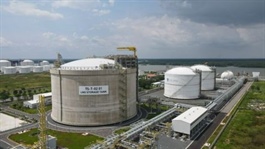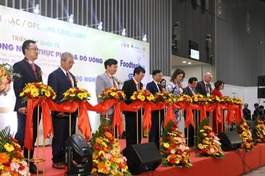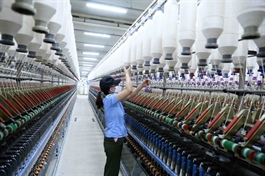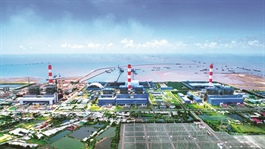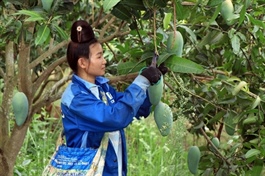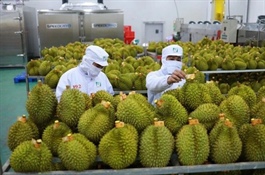Moving away from fossil fuels and Vietnam’s path
Moving away from fossil fuels and Vietnam’s path
Vietnam is advised to promote the engagement of different stakeholders and ensure that they equally benefit from the transition to clean energy.
More than 190 governments at the 2023 United Nations Climate Conference (COP28) have approved an agreement to “transition away from fossil fuels” – the primary cause of global warming.
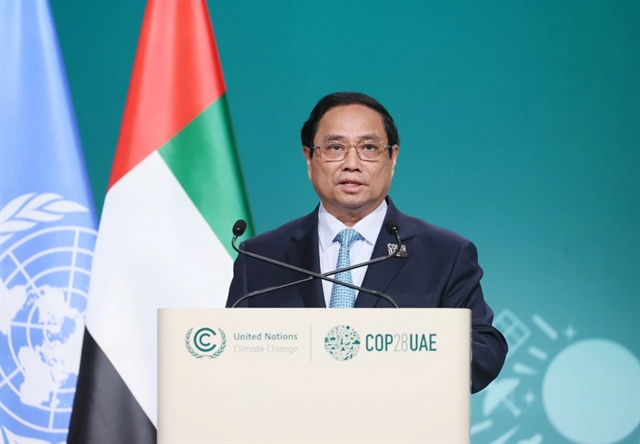
Vietnam's Prime Minister Pham Minh Chinh speaks at COP28 held in Dubai, UAE on Nov 30-Dec 12. Photo: VNA |
This agreement represents the first of its kind in the 28 years that international climate talks have taken place, calling for “transitioning away from fossil fuels in energy systems, in a just, orderly and equitable manner.”
COP28 President Sultan Al Jaber called the agreement “historic” after two weeks of negotiations at the conference. “We have language on fossil fuels in our final agreement for the first time ever.”
COP28 has grown to be the biggest COP summit in history, drawing nearly 140 heads of state and government as well as roughly 90,000 delegates.
Beyond the talks, COP28 brought with it a flurry of new international commitments ranging from tripling renewable energy and cutting emissions from oil and gas companies to improving global integration of climate change and biodiversity loss action, as well as food systems.
Commenting on the milestone, Nithi Nesadurai, Director and Regional Coordinator, Climate Action Network Southeast Asia (CANSEA) said this provides a clear and strong signal to the fossil fuel industry and fossil fuel-producing countries, starting with those in the Global North, to initiate the just transition process for phasing out fossil fuels.
Referring to Southeast Asia, he told The Hanoi Times that “The outcome of COP28 is useful for the region where nine countries have declared net zero emissions target between 2050 and 2065. They should use the decision to fix their phase-out date for fossil fuels in their long-term low emissions development strategies and work towards achieving it.”
Given Vietnam’s large part of coal-fired power in its power mix, the biggest challenge in phasing out fossil energy is its effect on the livelihoods of the workers, businesses, and communities dependent on and affected by the phasing out of coal-fired power plants. This is why the phasing out should be accompanied by a just transition process that is inclusive and ensures that all stakeholders equally benefit from the transition to clean energy, Nithi Nesadurai said.
COP28 also had some early financial success which was unprecedented. On the first day, nations formally adopted a loss and damage fund after decades of preparations to make pledges of more than US$700 million to support countries facing the worst effects of climate change. The fund though woefully inadequate, is expected to get more over time when it becomes operational.
Nithi Nesadurai believed that Vietnam, one of the most vulnerable countries to climate risk in the world, is eligible for the funding as the fund has its eligibility criteria for recipient countries, with priority likely given to small island developing states (SIDS), least developing countries (LDCs), and countries in the most vulnerable regions and have the least resources.
Vietnam’s footprints at COP28
Vietnam took part in COP28 with a high-ranking delegation led by Prime Minister Pham Minh Chinh who delivered a speech at the High-level Segment and chaired multilateral events.
The delegation’s efforts demonstrated Vietnam’s responsibility and commitment to the global pressing issues and strengthened the country’s multilateral diplomacy strategy by 2030 and programs on climate response, according to Vietnamese Deputy Minister of Foreign Affairs Do Hung Viet.
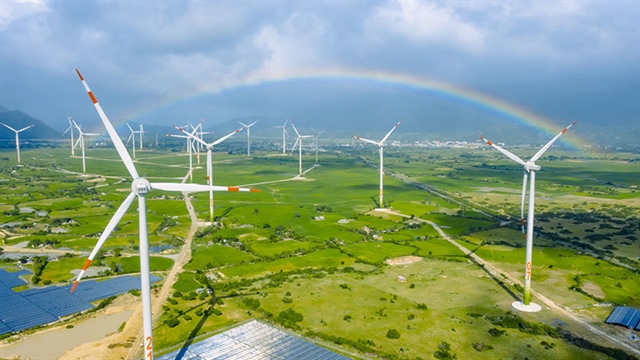
Dao Xuan Lai, Assistant Resident Representative, Head of Climate Change and Environment Unit, the United Nations Development Program (UNDP) in Vietnam, at COP28. Photo: UNDP Vietnam |
Echoing Do Hung Viet, Dao Xuan Lai, Assistant Resident Representative, Head of Climate Change and Environment Unit, the United Nations Development Program (UNDP) in Vietnam, underscored four imprints that Vietnam made at the global climate summit.
The first is the launch of the Resource Mobilization Plan by Vietnam’s Prime Minister Pham Minh Chinh. The move marks a significant step to advance the realization of the Just Energy Transition Partnership (JETP), which was reached in December 2022 by Vietnam and the International Partners Group (IPG) comprised of the European Union (EU), the United Kingdom (UK), Canada, Denmark, France, Germany, Italy, Japan, Norway, and the US.
The plan gives additional information about the US$15.8 billion in funding committed to the JETP. President of the European Commission Ursula von der Leyen said with the launch of the plan, Vietnam is leading the path for a future powered by clean energy. The EU supports the necessary reforms required to expedite vital investments in renewable energy and a green economy.
The second thing comes with a speech delivered on December 2 by the Vietnamese Prime Minister who highlighted Vietnam’s determination to fulfill net zero commitment made at COP26. He listed the country’s efforts since then and provided a roadmap for the low-carbon pathway with a focus on refining the legal framework related to smart power transmission, and direct power purchase agreement (DPPA) for renewable energy.
PM Chinh and Minister of Natural Resources and Environment (MONRE) Dang Quoc Khanh joined bilateral and multilateral meetings with developed countries and international groups for expanded partnerships in renewable energy, especially offshore wind power.
Remarkably, the Vietnam Pavilion set up at COP28, the country’s space for the first time at COP, facilitated the hosting of dozens of sessions to bring about international expertise and solutions for climate change response and energy transition. During the week-long agenda, the main focus was on Health/Relief, Recovery and Peace; Finance/Trade/Gender Equality/Accountability; Energy and Industry/Just Transition/Indigenous Peoples; Multilevel Action, Urbanization and
Built environment/Transport; Youth, Children, Education and Skills; Nature, Land Use, and Oceans; and Food, Agriculture and Water.

A wind farm in Vietnam developed by Trung Nam Group. Photo: Trung Nam Group |
Recommendations for Vietnam’s energy transition
Vietnam has reiterated its people-centric approach to climate change mitigation and adaptation strategies.
Regarding this, Nithi Nesadurai stressed the role of ongoing consultations with local voices and communities as well as civil society organizations, saying it should be a central part of an extensive and ongoing stakeholder involvement and engagement process. The issues should be involved in the discussions on climate mitigation and decide on alternative livelihoods which should be good and quality jobs.
To promote the engagement of different stakeholders, the first would be to map all these different stakeholders and set up an ongoing process to involve and engage them led by the national, provincial, or local authorities. Special efforts should be made to get the voices of women, indigenous peoples, and vulnerable communities in particular.
Sharing the same view, experts from the Earth Journalism Network (EJN) stressed the importance of adaptation for the fact that mitigation projects are normally profitable in terms of investment while adaptation benefits the country in the long term but is less attractive to the investors.
They said adaptation should be specific for different localities in each country with public financing. Vietnam is not an exception. As the requirements are different in regions. It would have various adaptation models for communities in the mountains and coastal areas, for example, farming with unpredictable weather. The adaptation projects are funded by the government but they must be specific in a decentralized way. At the grassroots level, it’s necessary to maximize local strengths and connect villagers for effective climate mitigation and adaptation models.
The experts stated that COP provides directions and guidelines, linking big global organizations and governments to push forward climate goals. But for some key issues including finance, the rich countries took up all their space. Vietnam, like other countries in G77, should work together for group negotiations to make their voices strong, the experts suggested.
As climate is a global crisis, the EJN has worked for better coverage of climate issues at COP. Through its Climate Change Media Partnership (CCMP), EJN experts help reporters gain background on the COP and thematic issues in their countries. For the coverage at COP28, the EJN ran two regional virtual programs to provide on-site and remote updates for reporters in the Lower Mekong region, the Middle East, and North Africa.
Experienced experts and international connections have enabled regional reporters, including those in Thailand and Vietnam, to produce in-depth stories that get higher readership.
Launched in 2007, CCMP, spearheaded by Internews’ Earth Journalism Network (EJN) and the Stanley Center for Peace and Security, awarded fellowships to more than 400 journalists from developing countries to cover the annual UN climate summits and other significant events.



